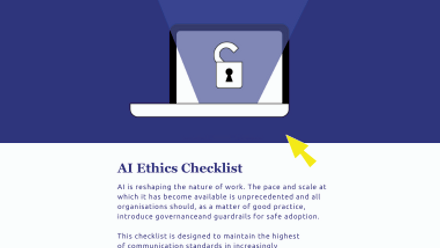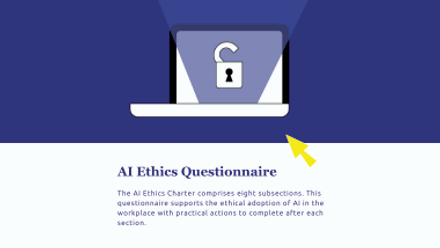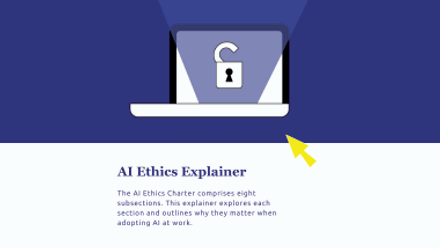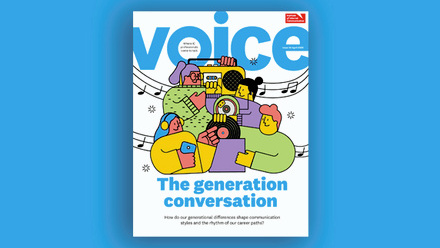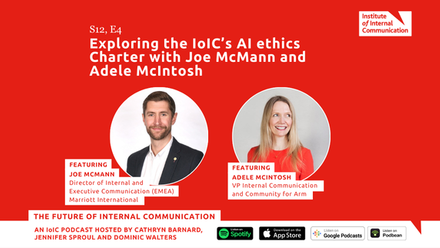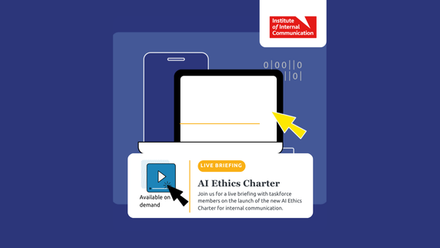The IoIC is launching an AI Ethics Charter to guide the responsible use of artificial intelligence within the internal communication profession.
Given the pace and scale of AI innovation, the Charter will be a living document, built around principles for ethical implementation of AI at work. It will address issues such as safety and privacy, data ethics, creativity, critical thinking, knowledge-sharing and sustainability.
The IoIC hopes the Charter, supporting resources and subsequent conversations will help practitioners proactively leverage this technology in a way that upholds both human and professional values, while remaining cognisant of its limitations.
Developed by a task force of IC practitioners from sectors including education, technology, the NHS and public sector, hospitality and renewable energy, the Charter reflects professional standards and the IoIC’s commitment to creating a framework that resonates across industries.
AI is shaping internal communication and our workplaces, says IoIC chief executive Jennifer Sproul.
"In our professional community, we’ve been considering – and together we must continue to discuss – how we embrace and optimally use AI. And how do we use it in the right way? The IoIC has been tracking and exploringthe future of work since 2019, so what does that look like now with the mainstream arrival of enterprise AI? In our profession, we have a great opportunity to shape the ethical and humane adoption of AI"
Managing trust and AI together
With economic pressures, geopolitical uncertainties, and changing workplace dynamics, it’s more important than ever to maintain trust in organisations.
“We are having to work with less,” says Jennifer. “Where budgets are cut, we need to make sure internal comms’ true value as a profession is not lost. Let’s embrace the technology in the best way and demonstrate our impact. It’s about maintaining trust and human connection and taking advantage of the opportunities new technology offers.”
Adopting ethical AI principles can help protect the workforce, businesses and organisations, as internal communicators introduce this shared insight to their employers. By setting clear boundaries and providing the internal communication community with a standard to guide them, the IoIC has an important role in mitigating potential risks associated with AI use, from data privacy issues to maintaining unbiased and inclusive practices.
Seeking input from members
Input from members is essential, says Jennifer. “The taskforce is keen for the IoIC community to ‘learn out loud’ together. It’s a great opportunity to role-model continuous social learning.”
The AI Ethics Charter will be a foundation for broader discussion and ongoing professional development. Plans include creating a dedicated space on the IoIC website where members can contribute feedback and ideas, to shape the Charter further.
Other initiatives will be developed to test new ideas, share case studies and experiences, and ensure that AI is implemented in ways that align with ethical and professional standards. The IoIC intends to use these discussions to further enhance the Charter, ensuring it stays relevant and reflective of the community’s evolving needs.
Maintaining a human connection
While the Charter brings potential for internal communicators to lead the way in creating trust in AI, Jennifer notes that internal communication’s future sits beyond this technology.
“The next year will be one of confidence and empowerment – looking at how this tech can be enabled and demonstrating our value beyond AI.”We can create opportunities to educate and inspire around AI adoption, but we must always remember that the core focus of our work is to engender human connection. AI will only be successful if it has human oversight. We can’t let our traditional values and behaviours around communication that have created so much trust up until now come under threat.
Core principles
The AI Ethics Charter will be published on 11 February 2025. It will cover issues including:
- Quality – ensuring the highest standards of internal communication are maintained.
- Safety – prioritising safety and privacy and upholding ethical standards for the benefit of all stakeholders.
- Human skills – AI adoption must complement rather than undermine creativity and critical thinking to promote human and moral agency.
- Trust – all AI-generated content should be verified to sustain organisational trust, accuracy and truthfulness.

